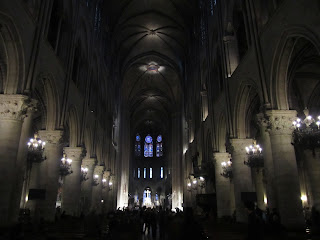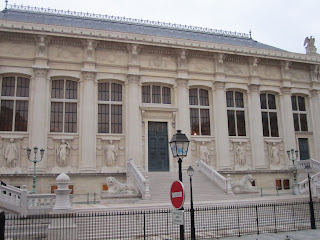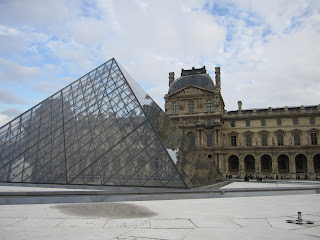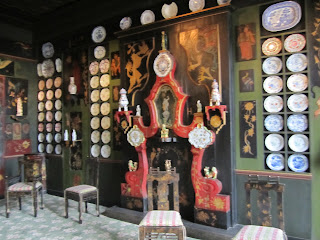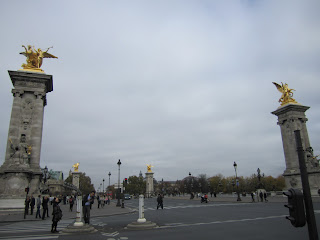The Bus to the End of the World
One might think, knowing our family, that one of the first orders of business upon our arrival in Geneva would be to find a running group or team or club or gang or something. After all, we are annoyingly enthusiastic about the sport. I did, upon finding out we were moving to Switzerland, do a little poking around on the internet. Finding, however, that any searches for "cross country" turned up skiing sites, I allowed myself to be distracted by other concerns, such as packing. When we reached Geneva, we found that sports are not organized so much by the schools as by local sports clubs. None of the ones around us seemed to have anything called "track," "cross country," or even "running." So the autumn slipped by in a haze of figuring out church, school, buses, grocery shopping, and other essentials.
It turns out that in my search for running, I was looking for the wrong thing (as so often is the case in a stange place). If you want to join a running team in Geneva, you have to look for "athletisme." I only found this out by accident, when one of Eric's co-workers offered to help us get in touch with the Stade de Geneve, which is an actual place, but also the name of a running team. We enthusiastically signed up and headed for practice (in truth, I enthusiastically signed Johanna and Lucas up, and they -- less enthusiastically, but still willingly -- headed for practice). My thinking was that the kids could get some exercise, meet some friends, and be forced to speak a little French. The only obvious problem with the whole setup was that the Stade de Geneve team practices at the end of the world. Literally, the name of the bus stop where the kids disembark is "Bout du Monde." It made me feel very Harry-Potteresque to be riding the Bus to the End of the World!
Only Johanna attended the first practice, and, despite the fact that no one there spoke English and the workout was really hard, she ended the evening happier than I've seen her in Switzerland (and she hasn't been unhappy). The second evening a really nice girl showed up who speaks English (unfortunately for the learning-French portion of my plot). The real trouble came in week two -- last Monday -- when Lucas came along and we met the Really Mean Swiss Coach. We arrived early, and only one coach (a man) was there, so I took Lucas over, introduced him, and explained that he was new.
"Quel age?" the coach barked. I told him.
"Cinq heures!" (It was now six -- not five -- and I was pretty certain that six was the time I was supposed to be here.)
"Six heures?" I ventured timidly.
"Non. Onze ans. Cinq heures. Cinq heures! Vous etes trop tard!"
I tried once more, asking if possibly Lucas couldn't practice with Johanna, since he was here now.
"Non! Il est trop petit. Elle est trop grande!" He said with not a hint of irony about calling Johanna too big for anything.
I was going to ask if maybe a different (I wasn't going to say "nicer") coach would be showing up anytime soon, but the man turned and started yelling at some adults (who looked as terrified as I felt) something that sounded like "Six trop!" Six trop!" which made no sense to me. So, deflated, I left with Lucas.
We returned on Wednesday, and I was determined not to let the Really Mean Swiss Coach scare us off again. So we bravely huddled in the corner and waited for a different coach to show up. It didn't happen, so just before six, I tiptoed over to the coach, clutching a printout of Luc's registration, which indicated that he was, indeed, signed up to practice at six o'clock. I smiled sheepishly, said, "Bonsoir Monsieur," and tried to explain the situation, showing him the printout. He took a cursory glance, sniffed derisively, and informed me that what he was holding was Johanna's registration. I was going to embark on an explanation of why this was not the case, but found I couldn't remember a word of French. A teenaged boy sitting next to the coach asked (in English) if he could help. I explained the situation and he shrugged apologetically and suggested I wait for another coach. Shortly, a young female coach showed up, and I noticed that several boys about Lucas' age were walking over to her. Upon asking how old these boys were, I received the baffling but welcome response that they were all 11 -- the same age as Lucas. Luc joined the group of boys -- who had been standing right in front of Mean Coach when he told me this was not the time for 11-year-olds -- and off they went. It would be a happy ending, except that Lucas decided that he didn't like the team (I don't think the mean guy helped), and so now Johanna takes the Bus to the End of the World alone.
In other sports news: The Alien and her husband will run the Trans Onesienne road race on Saturday, Nov. 19. If it's at all interesting, amusing, or embarassing, rest assured you will find the full report here.
The Alien attempts to sign her son Drew up for tennis lessons during the wrong season in a foreign language. Success has been, predictably, limited, but next week he will start a "physical conditioning" class -- whatever that is. We skipped the "mental preparation" option. Perhaps we will regret it.
Subterranean French Hysterics
This incident is pretty old by now, but it is too good to leave out. A few weeks ago I went to drop off some quince jelly at Luisa's house. For reasons which were important then but aren't important here, I drove the car. By now, everyone should realize that that was Mistake Number One. Traffic wasn't bad, so I reached Luisa's neighborhood quickly. Unfortunately, I could find absolutely nowhere to park. I drove around for a bit, then spied the welcome blue "P" that means public parking. I pulled into the underground lot marked for the Charmilles Shopping Center, parked my car, found Luisa's apartment, handed over the jelly, and zipped back to the car, by now running slightly late for my next appointment.
What should meet my eyes when I entered the parking garage but a solid metal door, blocking the entrance to the lot where I had parked. I now could see clearly that the Charmilles Center parking was to the left, and I had inadvertently pulled into private parking, on the right. The door, which I hadn't noticed because it had been up, was now quite firmly down. And, as one could predict in cases such as these, I had left my cell phone in the car. As I paced nervously about, a car pulled up and the driver asked if I had forgotten my key. I tried to explain, and said something like: "I drive in. The door is open. I come back. The door is closed. I thought this was Charmilles Parking, but it is private!" She laughed and drove away. In her defense, I will say that I was probably not very clear -- and what was she supposed to do anyway? I pressed the call button on the conveniently located machine that opens the door, but nothing happened.
Glancing hastily around, I noticed a telephone number on the door and decided to write it down and see if I could find a telephone somewhere. Perhaps the number would connect me with someone who could 1. Understand what I was babbling about; and 2. Come and help me. Somehow in my search, I ended up not in the shopping center, but in an underground office space. As I turned to leave and continue looking for a phone, a nice young man noticed my distress and asked if he could help. So I lauched into toddler-level explanation of events, "I drive in. The door is open. . . ." ending this time with: "Je suis tres stupide!" He took me to his telephone and when it became obvious that I was unable to explain adequately to the person who answered, came to my rescue there as well. Unfortunately, though the situation was now perfectly clear to the party on the line, he was just the man fron the surveillance company, and could do nothing about opening the door. He suggested I press the call button on the machine by the door. I had done this, of course, to no avail. Trying to control my mounting panic and supress visions of my car being impounded by the Swiss police and -- worse -- having to tell Eric about it, I told the man whose phone I had used thank you and that I would go press the button again. He must have noticed that I was quickly losing my grip . . . and perhaps feared what other trouble this imbecille foreigner might get herself into if left loose in the city, because he offered to go with me.
He used his key to get into the elevator, and when we reached level -2, there was the car. It seemed like progress to be on the same side of the door as my vehicle, and I felt myself relax a bit. We walked up the ramp and saw that the door was, indeed, firmly shut. My new friend, however, noticed something -- bumps on the ramp floor that, if one drove over them, would activate the opening of the door from the inside. He explained this to me, using very small words. I thanked him about a gazillion and one times, climbed into the car, and drove effortlessly over the bumps and out of the private parking garage, thanking God for sending help and vowing, once again, to NEVER DRIVE IN GENEVA IF I DON'T HAVE TO!
In other French-language news: The Alien Visits the Elderly Swiss Lady with the Jelly Jars (happening tomorrow -- say a prayer if you think of it)
The Alien Attemps to Improve French Comprehension by Watching Internet Cooking Shows (I now know how they make brie and butter, and can reliably recognize when someone is talking about cows, milk, or cheese. This is sure to come in handy next time I lock my car in a private parking garage,)






















